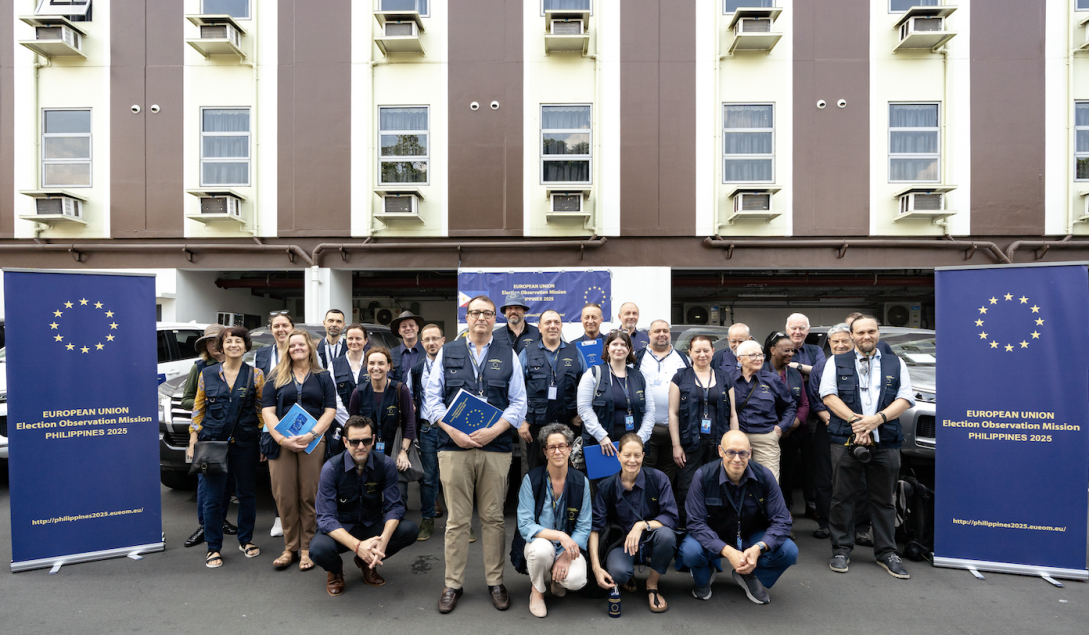EU Election Observation Mission deploys 72 long-term observers across the Philippines

The European Union Election Observation Mission (EU EOM) for the National Midterm Elections in the Philippines has deployed 72 long-term observers throughout the country today. Prior to their deployment, the long-term observers received a comprehensive briefing in Manila on the framework for elections, the political environment, the campaign and the media and social media ecosystem.
The EU EOM is led by Chief Observer Marta Temido, a Member of the European Parliament from Portugal, who will undertake her first visit to the Philippines in the coming days. The Deputy Chief Observer, Manuel Sánchez de Nogués, stated today: “Our long-term observers will be deployed across all regions of the Philippines, covering both urban and rural areas. They will observe the electoral process before, during, and after the vote on 12 May, and will meet with electoral officials, candidates, civil society representatives, and the media to gain a comprehensive understanding of the electoral process.”
Around 100 short-term observers will join the EU EOM shortly before Election Day, together with a Delegation of members of the European Parliament and accredited diplomats. In total, more than 200 observers from EU Member States, Canada, Norway and Switzerland will observe election operations on 12 May.
“The EU Election Observation Mission conducts a comprehensive analysis of the electoral process using a well-established methodology developed by the EU over more than two decades and consistently applied across all countries where we observe. The Mission focuses on key aspects of the electoral process, including the legal framework, the work of the election administration, the election campaign, the role of the media and the social media, voting, automated counting, tabulation the of results, and the resolution of election-related disputes. The Mission operates with complete independence and impartiality and does not interfere in the electoral process”, Mr. Sánchez de Nogués further explained.
The EU EOM will issue a preliminary statement shortly after election day and will remain in the country until the end of May. A final report will be published at a later stage and will include recommendations presented to the Philippine authorities for their consideration in future elections.
In response to an invitation from the Government of the Philippines to observe the National Midterm Elections, the European Union has deployed an Election Observation Mission, which has been present in the country since 28 March. The EU EOM Philippines 2025 is independent from the EU institutions and EU member states. It is committed to remaining neutral and to abide by the Declaration of Principles for International Election Observation and the Code of Conduct for International Election Observers, as well as the laws of the Republic of the Philippines.
PRESS RELEASE IN FILIPINO
Nagpdala ng 72 long-term election observers sa buong Pilipinas ang European Union Election Observation Mission (EU EOM) upang obserbahan ang nalalapit ng halalan sa bansa. Bago sila ipadala sa mga rehiyon, sumailalim sila sa komprehensibong pagsasanay sa Maynila kung saan ipinaunawa sa kanila ang proseso ng halalan, ang lagay ng pulitika sa bansa, mga gawaing pangkampanya, at ang galaw ng balita at mga usapan sa media at social media.
Ang EU EOM ay pinamumunuan ni Chief Observer Marta Temido, isang miyembro ng EU Parliament mula sa Portugal. Siya ay bibisita sa bansa sa mga susunod na araw, habang si Deputy Chief Observer, Manuel Sánchez de Nogués, ay nasa bansa na upang pasinayaan ang pagpapadala ng observers. “Ang aming mga long-term observers ay ipapadala sa iba’t-ibang rehiyon sa bansa, kasama ang mga kalungsuran at kanayunan. Sila ay magoobserba ng buong proseso ng halalan, mula sa mga paghahanda, mga kampanya, pagboto, bilangan at mga aktibidad pagkatapos ng halalan sa Mayo 12. Sila ay makikihalubilo sa mga nangagasiwa ng halalan, mga representante ng civil society groups at mga miyembro ng media para lubusang maunawaan ang buong proseso ng halalan sa bansa.”
Aabot sa 100 short-term observers ang sasama sa EU EOM ilang araw bago ang araw ng halalan, at makakasama nila ang mga miyembro ng delegasyon ng EU Parliament at mga akreditadong diplomat. Sa kabuuan, higit sa 200 na observers mula sa mga bansang kasapi ng EU pati na ng mga bansang Canada, Norway at Switzerland ang mag-oobserba ng eleksyon sa Mayo 12.
“Ang EU Election Observation Mission ay magsasagawa ng komprehensibong pag-aanalisa ng proseso ng halalan sa Pilipinas batay sa metodolohiyang binuo ng EU mula sa dalawang dekada nitong karanasan sa pag-oobserba ng mga halalan sa iba’t-ibang bansa sa buong mundo. Tututukan ng misyon ang mahahalagang aspeto ng halalan, kabilang na ang legal na balangkas ng mga batas panghahalan, gawain ng mga nangangasiwa ng halalan, proseso ng kampanya, mahalagang bahagi ng media at social media, hanggang sa pagboto, pagtala at pagbilang ng boto at sa pagresolba ng mga pagtutol o pagprotesta sa resulta ng halalan,” sabi ni Sánchez de Nogués.
Maglalabas ang EU EOM ng preliminary statement ilang araw matapos ang araw ng eleksyon at sila ay mananatili sa bansa hanggang sa katapusan ng Mayo. Matapos nito, ang pinal na ulat ay isasapubliko na may kasamang mga rekomendasyon para sa ikabubuti ng mga susunod na halalan.
Ang buong misyon ay tugon sa imbitasyon ng gobyerno ng Pilipinas na obserbahan ang National Midterm Elections ngayong taon. Ang EU EOM Philippines 2025, na nagsimula ng operasyon nuong Marso 28, ay isang malaya at hiwalay sa mga institusyon sa mga estadong kasapi ng EU. Naninindigan ang misyon na ito ay mananatiling tapat, walang kinikilingan at susunod sa Declaration of Principles for International Election Observation, sa Code of Conduct for International Election Observers at sa mga batas ng Republika ng Pilipinas.
